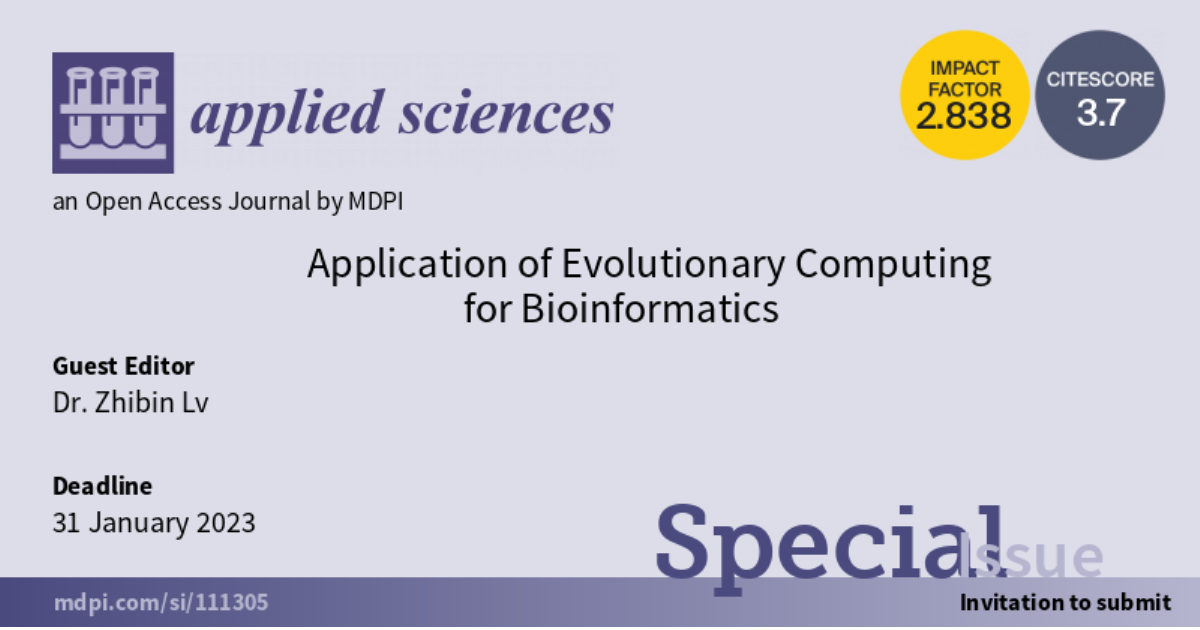- 2.5Impact Factor
- 5.5CiteScore
- 17 daysTime to First Decision
Application of Evolutionary Computing for Bioinformatics
This special issue belongs to the section “Computing and Artificial Intelligence“.
Special Issue Information
Dear Colleagues,
Bioinformatics is an emerging multidisciplinary field that engages in the acquisition, processing, storage, distribution, and interpretation of biological information and integrates mathematical, computer science, and biological tools to understand biology in data. By contrast, evolutionary computing, also known as evolutionary algorithms, is a family of global optimization algorithms inspired by biological evolution, as well as the subfields of artificial intelligence and soft computing that study these algorithms. It is based on a series of algorithms based on population evolution including genetic algorithm (GA), evolutionary strategy (ES), genetic programming (GP), etc., with meta-heuristic or stochastic optimization features. In recent years, with the continuous accumulation of biological big data, the processing of biological information has become challenging. Evolutionary computing, especially the combination of evolutionary computing and emerging algorithms such as machine learning and deep learning, has been widely used in bioinformatics.
In this Special Issue, we invite submissions exploring cutting-edge research and recent advances in the fields of applying evolutionary computing algorithms for bioinformatics. Both theoretical and experimental studies are welcome, as well as comprehensive review and survey papers. The bioinformatics tasks mentioned in the manuscripts may include but are not limited to 1) the alignment and comparison of DNA, RNA, and protein sequences; 2) epigenetics; 3) identification of gene regulatory networks; 4) structure prediction; 5) biological sequence identification and functional analysis; and 6) the relationship between biological sequences and diseases, etc.
Dr. Zhibin Lv
Guest Editor
Manuscript Submission Information
Manuscripts should be submitted online at www.mdpi.com by registering and logging in to this website. Once you are registered, click here to go to the submission form. Manuscripts can be submitted until the deadline. All submissions that pass pre-check are peer-reviewed. Accepted papers will be published continuously in the journal (as soon as accepted) and will be listed together on the special issue website. Research articles, review articles as well as short communications are invited. For planned papers, a title and short abstract (about 250 words) can be sent to the Editorial Office for assessment.
Submitted manuscripts should not have been published previously, nor be under consideration for publication elsewhere (except conference proceedings papers). All manuscripts are thoroughly refereed through a single-blind peer-review process. A guide for authors and other relevant information for submission of manuscripts is available on the Instructions for Authors page. Applied Sciences is an international peer-reviewed open access semimonthly journal published by MDPI.
Please visit the Instructions for Authors page before submitting a manuscript. The Article Processing Charge (APC) for publication in this open access journal is 2400 CHF (Swiss Francs). Submitted papers should be well formatted and use good English. Authors may use MDPI's English editing service prior to publication or during author revisions.
Keywords
- evolutionary computing
- bioinformatics
- machine learning
- biosequence analysis

Benefits of Publishing in a Special Issue
- Ease of navigation: Grouping papers by topic helps scholars navigate broad scope journals more efficiently.
- Greater discoverability: Special Issues support the reach and impact of scientific research. Articles in Special Issues are more discoverable and cited more frequently.
- Expansion of research network: Special Issues facilitate connections among authors, fostering scientific collaborations.
- External promotion: Articles in Special Issues are often promoted through the journal's social media, increasing their visibility.
- Reprint: MDPI Books provides the opportunity to republish successful Special Issues in book format, both online and in print.


